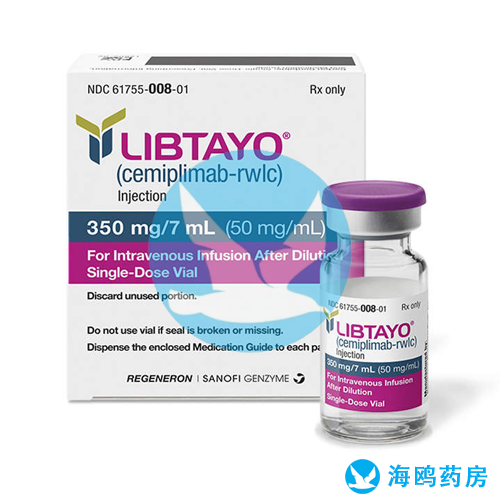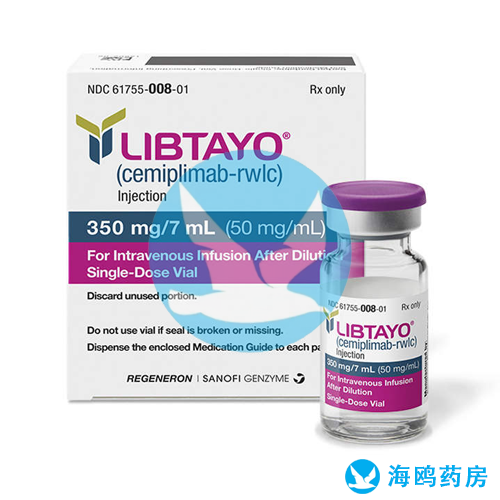- All Drug Categories
- Home
- Anti-cancer Drugs
- Healthcare Products
- Medical Information
- Statement
Treatment with cemiplimab (Libtayo) resulted in significantly longer survival compared with single agent chemotherapy in patients with recurrent cervical cancer who received platinum-containing chemotherapy in the first line, according to findings from the phase 3 EMPOWER-Cervical 1 study (NCT03257267).

Patients in the cemiplimab arm experienced a median overall survival (OS) of 12.0 months compared with 8.5 months in the chemotherapy arm (HR for death, 0.69; 95% CI, 0.56-0.84; P <.001). The OS benefit was notably consistent across histologic subgroups. The median progression-free survival (PFS) was 2.8 months in the cemiplimab arm compared with 2.9 months in the chemotherapy arm (HR, 0.75; 95% CI, 0.63-0.89; P <.001).
In an interview with CancerNetwork®, Krishnansu S. Tewari, MD, a gynecologic oncologist at the University of California, stated, “What we need to do is think about 2 things with this drug: One is, should we move it further [in terms of lines of therapy]? Should it be studied in the first-line setting or should it even be studied prior to or before patients relapse?”
The open label, multicenter trial included patients whose tumors progressed following platinum-based chemotherapy for the treatment of recurrent or metastatic disease. Prior treatment with bevacizumab (Avastin) and paclitaxel were also required. Patients also needed to have an ECOG performance status of 0 or 1, measurable disease, and adequate renal, hepatic, and bone marrow function.
Those who enrolled on the trial (n = 608) were randomized 1:1 to either 350 mg of intravenous cemiplimab every 21 days for 96 weeks (n = 304) or 500 mg of pemetrexed; 1 mg of topotecan or 100 mg of irinotecan; and 1000 mg of gemcitabine and vinca alkaloid vinorelbine at 30 mg (n = 304). Patients in the cemiplimab arm had the option for retreatment for patient who completed 16 cycles of therapy and had subsequent progressive disease in the post-treatment follow-up period.
Median age of the population was 51 years. Most patients had squamous cell histology (77.8%) and others had adenocarcinoma or adenosquamous carcinoma (22.2%). Roughly 40% of the population had previously been treated with 1 or more prior lines of systemic therapy for recurrent disease, and about 50% had been treated with bevacizumab.
“This group of patients been previously treated with chemotherapy, with or without anti-angiogenesis therapy and with or without checkpoint inhibitors, [and] comprised a very high-risk population,” Tewai said. “There are very few treatments that are effective in the second line.”
The median treatment durations were 15.2 weeks and 10.1 weeks in the cemiplimab and chemotherapy arms, respectively. The median follow up from randomization to cut off was 18.2 months across all study arms. A total of 37 patients remained on treatment with cemiplimab at data cut off, 1 patient was being retreated with cemiplimab, and 7 were still undergoing treatment with chemotherapy. Additionally, 65.5% and 75.3% of patients, respectively, experienced disease progression that led to treatment discontinuation.
Notably, OS in the chemotherapy arm ranged from 6.5 months among those treated with topotecan and 11.8 months for those who received irinotecan. Among patients with squamous cell carcinoma, the median OS was 11.1 months vs 8.8 months among patients treated with cemiplimab and chemotherapy, respectively (HR, 0.73; 95% CI, 0.58-0.91; 2-sided P = .006). Among those with adenocarcinoma or adenosquamous carcinoma, the median OS was 13.3 months and 7.0 months (HR, 0.56; 95% CI, 0.36-0.85) across both treatment arms, respectively.
Overall, patients in the cemiplimab arm had an objective response rate (ORR) of 16.4% (95% CI, 12.5%-21.1%) vs 6.3% (95% CI, 3.8%-9.6%) in the chemotherapy arm (2-sided P <.001). The median duration of response was 16.4 months and 6.9 months in both groups, respectively. In the subgroup of patients with squamous cell histology, the ORR was 17.6% and 6.7%, respectively, as well as 12% and 4% among those with adenocarcinoma or adenosquamous carcinoma.
In terms of safety, 88.3% of patients in the cemiplimab arm and 91.4% of those in the chemotherapy arm experienced an adverse effect (AE), with 45.0% and 53.4% of patients experiencing grade 3 or higher AEs, respectively. Common grade 3 or higher AEs in the cemiplimab and chemotherapy arms, respectively, were anemia (12.0% vs 26.9%), urinary tract infection (5.0% vs 2.8%), and neutropenia (1.0% vs 9.0%). A total of 8.7% of patients in the cemiplimab arm and 5.2% of patients in the chemotherapy arm discontinued due to AEs. Further, AEs leading to death took place in 1.7% and 0.7% of patients, respectively.
Investigators stated that no AEs leading to death appeared to be related to treatment with cemiplimab. Immune-related AEs occurred in 15.7% of those treated with cemiplimab and 0.7% of those treated with chemotherapy.
The biologics license application for cemiplimab for the second-line treatment of advanced cervical cancer was voluntarily withdrawn by developer Regeneron Phrmaceuticals following discussions with the FDA.
Reference
https://www.cancernetwork.com/view/cemiplimab-achieves-promising-survival-in-recurrent-cervical-cancer
Disclaimer:《Cemiplimab Achieves Promising Survival in Recurrent Cervical Cancer》Edited and sorted by Seagull Pharmacy's editors. Please contact us in time if there is any infringement. In addition, the suggestions for drug usage, dosage and disease mentioned in the article are only for medical staff's reference, and can not be used as any basis for medication!

Full Name:cemiplimab,Libtayo,cemiplimab-rwlc
Reference Price:$17825.00
Prescribing Information: 西米普利单抗(cemiplimab)说明书 通用名:西米普利单抗 商品名:Libtayo 全部名称:西米普利单抗,西米单抗,cemiplimab,Libtayo,cemiplimab-rwlc 适应症: 适用于用于治疗转移性皮肤鳞状细胞癌(CSCC)或局部晚期...